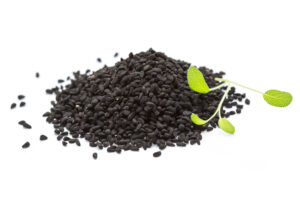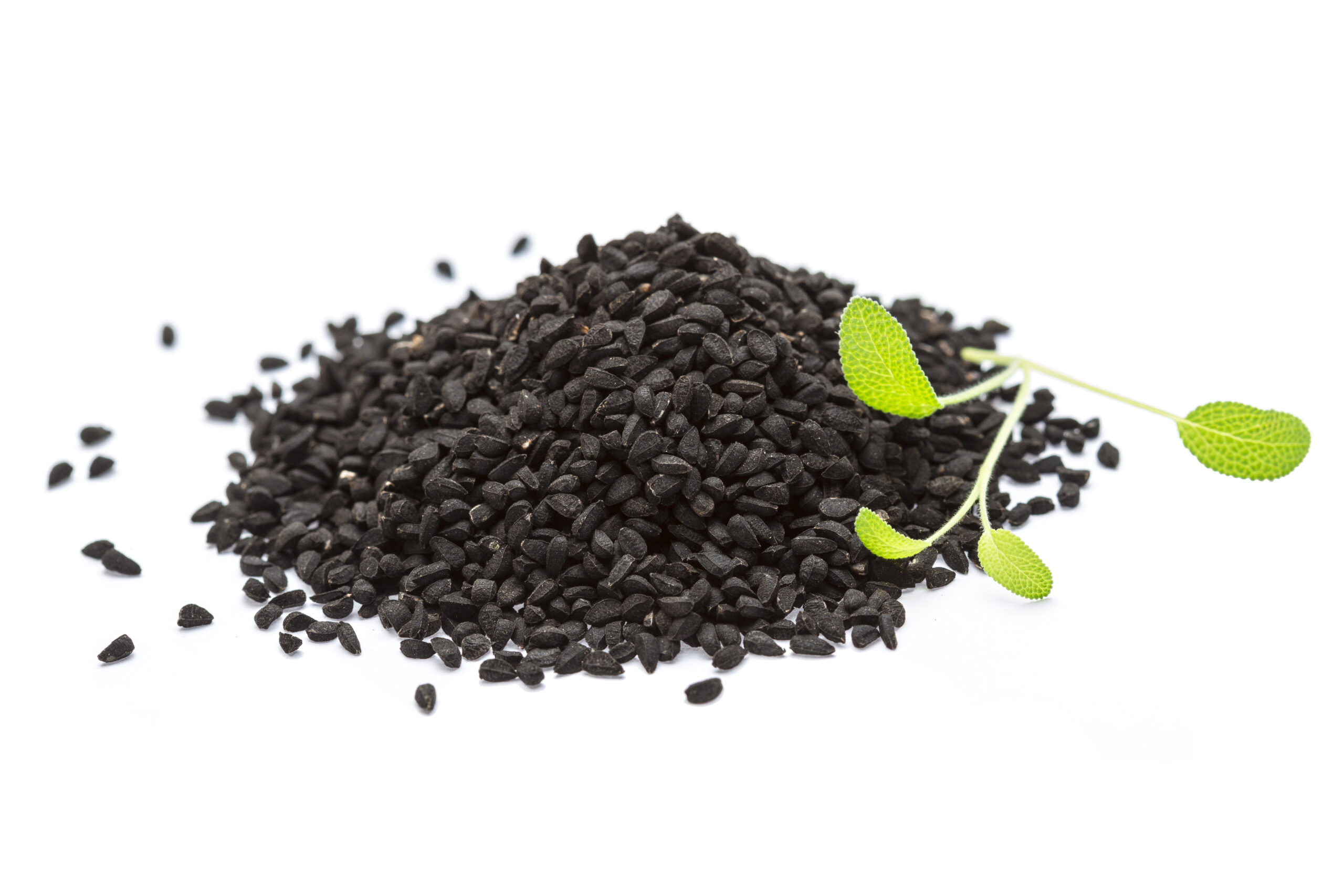Written by Jessica Patella, ND. Nigella sativa seed oil was shown to be safe and beneficial in pediatric patients with type 1 diabetes. It was shown to improve cholesterol levels, LDL cholesterol, inflammatory markers and subclinical left ventricular dysfunction, suggesting a cardioprotective effect in these patients.
 Diabetic cardiomyopathy is cardiac dysfunction that occurs from both structural and functional changes to the heart, due to diabetes. Diabetic cardiomyopathy has been reported in type 1 diabetic children and adolescents. Recent research has found supplementing Nigella sativa may improve some signs of diabetic cardiomyopathy, including, left ventricular dysfunction, cholesterol levels, and inflammatory factors in pediatric patients with type 1 diabetes1.
Diabetic cardiomyopathy is cardiac dysfunction that occurs from both structural and functional changes to the heart, due to diabetes. Diabetic cardiomyopathy has been reported in type 1 diabetic children and adolescents. Recent research has found supplementing Nigella sativa may improve some signs of diabetic cardiomyopathy, including, left ventricular dysfunction, cholesterol levels, and inflammatory factors in pediatric patients with type 1 diabetes1.
Nigella sativa is also known as black seed and is a traditional medicinal plant. One constituent in Nigella sativa is thymoquinone, which has been shown in previous research to improve type 2 diabetes, hypertension and chronic diseases2-4. This is the first research study to examine the effect of Nigella sativa on cardiac functioning in pediatric patients with type 1 diabetes1.
Diabetes is a major risk factor for cardiovascular disease1,5. Assessing left ventricular function can help in the early diagnosis of diabetic cardiomyopathy1,6. Previous research also documented increased levels of troponin I, in diabetic children, can be an early marker of myocardial injury1,7. Chronic hyperglycemia also increases inflammatory responses, which is measured by tumor necrosis factor (TNF-alpha)1,8.
The research included 60 pediatric patients (mean age 12.4 +/- 2.3 years) with type 1 diabetes (mean duration of 3.1 +/- 1.8 years). The patients were randomly assigned to one of two groups. The treatment group (n=30) received 450 mg of Nigella sativa seed oil twice daily after meals for 3-months in addition to insulin. The control group (n=30) received insulin alone.
After 3-months the following results were observed:
- The group taking Nigella sativa seed oil showed significantly lower results than the control group in the following:
- Total cholesterol (153.0 +/- 13.5 vs 160.5 +/- 13.2 mg/dL; p=0.024)
- LDL cholesterol (78.9 +/- 9.8 vs 88.3 +/- 9.8 mg/dL; p<0.001)
- Nitric oxide (40.5 +/- 3.7 vs 48.6 +/- 4.8 nmol/dL; p<0.001)
- TNF-alpha (8.5 +/- 2.4 vs 10.3 +/- 2.8 pg/mL; p=0.009)
- Troponin I levels (0.04 +/- 0.02 vs 0.06 +/- 0.02 ng/mL; p=0.002)
- The group taking Nigella sativa seed oil also showed improvement in heart functioning
- The systolic function measured by electrocardiography (2D-LVGLS) was significantly improved in the Nigella sativa group compared to baseline and the control group. (2D-LVGLS: -20.1 +/- 1.5 vs baseline -17.6 +/- 1.56, vs control -17.7 +/- 2; p<0.001)
- The diastolic function measured by electrocardiography (LV E’/A’ ratio) was significantly improved in the Nigella sativa group compared to baseline and the control group. (LV E’/A’: 1.33 +/- 0.16 vs baseline 1.2 +/- 0.17 vs control 1.21 +/- 0.16; p=0.008)
In conclusion, Nigella sativa seed oil was shown to be safe and beneficial in pediatric patients with type 1 diabetes. It was shown to improve cholesterol levels, LDL cholesterol, inflammatory markers and subclinical left ventricular dysfunction, suggesting a cardioprotective effect in these patients. Future research should consider including a placebo, a larger sample population and longer-duration of monitoring1.
Source: El-Afify, Dalia, and Doaa El Amrousy. “Cardioprotective Effect of Nigella sativa in Pediatric Patients with Type 1 Diabetes Mellitus: A Randomized Controlled Study.” Pediatric Drugs (2025): 1-9.
© The Author(s) 2025
Click here to read the full text study.
Posted September 8, 2025.
Jessica Patella, ND, is a naturopathic physician specializing in nutrition and homeopathic medicine and offers a holistic approach to health. She earned her ND from Sonoran University (formerly Southwest College of Naturopathic Medicine in Tempe, AZ). Dr. Patella has been involved in research since high school, when she presented her research at University of Florida on Group B Strep in pregnant women. While earning a bachelors in exercise physiology at Florida State University, her honors research was examining lifestyle effects on glucose levels in women. Dr. Patella was also a research assistant while in naturopathic medical school and has been writing for the Natural Health Research Institute since she graduated from Sonoran University in 2009. Dr. Patella currently teaches a variety of classes all related to human health.
References:
- El-Afify D, El Amrousy D. Cardioprotective Effect of Nigella sativa in Pediatric Patients with Type 1 Diabetes Mellitus: A Randomized Controlled Study. Pediatric Drugs 2025; 27:481-489. doi:10.1007/s40272-025-00687-5
- Adam SH, et al. Potential health benefits of Nigella sativa on diabetes mellitus and its complications: a review from laboratory studies to clinical trials. Front Nutr. 2022;9:1057825.
- Maideen NMP, Balasubramanian R, Ramanathan S. Nigella sativa (black seeds), a potential herb for the pharmacotherapeutic management of hypertension. Curr Cardiol Rev. 2021;17(4):e230421187786.
- Pop RM,et al. Nigella sativa: valuable perspective in the management of chronic diseases. Iran J Basic Med Sci. 2020;23(6):699–713.
- Julián MT, Pérez-Montes de Oca A, Julve J, Alonoso N. The double burden: type 1 diabetes and heart failure—a comprehensive review. Cardiovasc Diabetol. 2024;23(1):65.
- Adal E, et al. Asymptomatic cardiomyopathy in children and adolescents with type 1 diabetes mellitus: association of echocardiographic indicators with duration of diabetes mellitus and metabolic parameters. J Pediatr Endocrinol Metab. 2006;19:713–26.
- Segre CA, et al. Troponin in diabetic patients with and without chronic coronary artery disease. BMC Cardiovasc Disord. 2015;15:72.
- Westermann D, et al. Inhibition of p38 mitogen-activated protein kinase attenuates left ventricular dysfunction by mediating pro-inflammatory cardiac cytokine levels in a mouse model of diabetes mellitus. Diabetologia. 2006;49:2507–13.







Comments (0)